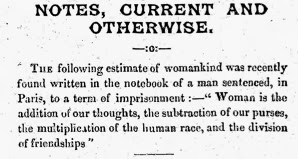Written by: Alfred Doten
THE INQUISITIVE TRAVELERTWO CONSCIENCELESS NEVADANS GIVE HIM POINTS FOR HIS NOTEBOOKShortly before the recent long-continued snow blockade, writes Alf Doten to the Virginia (Nev.) Enterprise, two of us were on our return from Reno, seated in the comfortable smoking car of the regular passenger and mail train. on the seat ahead of us was a peculiar-looking individual, with small round top-hat, side whiskers, eye glasses, and tourist style. Nothing escaped his eye in passing, and he took frequent lead-pencil notes in a little book. His ears were evidently as eager as his eyes, for pretty soon he showed the same by frequently, and as we considered impertinently, interrupting our conversation with such questions as:"Excuse me, but what did you say the gentleman's name was that is going to build dams to irrigate with?""Newlands."Then we saw him note down "Newlands - dams - irrigation." Soon he again interrupted us with: "Is that the State prison, over there, that you speak of? How old did you say these prehistoric tracks are?""About 17,000,000 years; don't know exactly, but they were there before the prison was built.""Aw, dontcher know, that's a singular circumstance" - and we saw him note it down: "State prison - tracks of the builders - 17,000,000 years old.""Comstock ore - Morgan mill - full blast all the time, did you say?""Yes, yes, it's a quartz mill, where they grind the silver out of the rock that comes from the Comstock lode.""But how do they collect the silver?""Oh, that's simple enough; they grind the ore to a sort of sandy meal, as it were, and stir it up in a big pan loaded with quicksilver, which catches the silver and the sand washes off. Then they squeeze and roast the quicksilver out and have the pure commercial silver bullion."Down went this into his little notebook: "Comstock silver meal - roasted - commercial bullion."His annoying interruptions and notes, as well as his inquisitively peculiar style, began to interest us, and we didn't mind steam boating him a little."What's that you say - the trout in the river along here have no teeth?""Certainly not, below the mills; the floured quicksilver in the water salivates them so that their teeth drop out.""Egad! but that's natural enough" and we saw him note down: "Trout in river all salivated - lose teeth - become suckers.""No apples on sagebrush last year, did I hear you say?""None whatever; been getting scarcer every year for some time. Indians have to buy dries apples instead."Down went this in his notebook: "Sagebrush apple crop failure - the poor Indian."A party of Italian woodchoppers in the forward end of the car were amusing themselves with songs, choruses, and a big black bottle."How was that? An opera troupe?""Oh, yes; the railroad company employs them regularly to run over the road for the amusement of the passengers."Then we saw him note down: "Worst singers on earth travel the road; also two of the worst liars."Here he pocketed his notebook, for we had arrived at Virginia.Last week we met him again, on C-street. He was just up from Carson, where he had been during the blockade. He knew us right off, and shook hands."Got short of coal here, did you? How did provisions hold out?""Very well. Potatoes got scarce, but we soon got a supply from Dayton through the Sutro Tunnel and hoisted up the C. and C. shaft."We slyly glanced over his shoulder and saw him make the following note in his little book: "Only use made of Sutro Tunnel is transporting potatoes from Carson River to the Comstock. Met those two infernal champion liars again."
